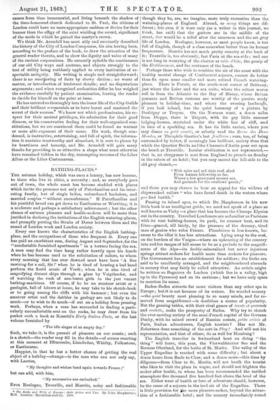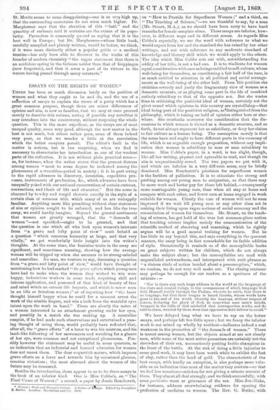BATHING-PLACES. • THE autumn holiday, which was once a luxury, has
now become, to those who live in cities, a necessity ; and, as everybody goes out of town, the whole coast has become studded with places which invite the presence not only of Paterfamilias and his inter- esting family, but of single ladies, unburdened bachelors, and married couples " without encumbrance." If Paterfamilias and his youthful brood can get down to Eastbourne or Worthing, it is a moderate and perhaps a satisfactory achievement ; but the other classes of autumn pleasure and health-seekers will be more than justified in declining the invitations of the English watering-places, and promptly putting the Straits of Dover between them and the round of London work and London society.
Every one knows the characteristics of the English bathing- place, and the occupations of those who frequent it. Every one has paid an exorbitant sum, during August and September, for the " comfortable furnished apartments " in a terrace facing the sea. A man may find the time hang rather heavily upon his hands when he has become used to the solicitation of sailors, to whom every morning that has ever dawned must have been A fine morning for a sail, Sir !' when he is tired of hearing a bad band perform the florid music of Verdi ; when he is also tired of magnifying distant ships through a glass by Voigtlander, and of watching the rush of sun-burnt girls to the just vacant bathing-machines. Of course, if he be an amateur artist or a geologist, full of leisure at home, he may take to his sketch-book or to going among the cliffs with his hammer ; but even the amateur artist and the dabbler in geology are not likely to do much—or to wish to do much—if out on a holiday from pressing work. Perhaps, when a man has succeeded in finding a parti- cularly uncomfortable seat on the rocks, he may draw from his pocket such a book as Rossetti's Early Italian Poets, or the last volume furnished by
"The idle singer of an empty day."
Such, we take it, is the pursuit of pleasure on our coasts ; such is a sketch—the reader may fill in the details—of scenes enacting at this moment at Ilfracombe, Llandudno, Whitby, Folkestone, or Eastbourne.
Happier, in that he has a better chance of getting the real object of a holiday—change—is the man who can not only say, with Laertes,
"My thoughts and wishes bend again towards France ;"
but can add, with him,
"My necessaries are embarked."
Even Boulogne, Trouville, and Biarritz, noisy and fashionable
• The Baths and Wells of Europe: their Action and Uses. By John Macpherson, 31.D. London: Macmillan and Co. 1869.
though they be, are, we imagine, more truly recreative than the watering-places of England. Abroad, so many things are dif- ferent; but even if it were only (as a writer in this journal, we think, has said) that the gutters are in the middle of the street, that would be a relief after the sameness and the set grey life of London. Boulogne, however, as most people know, is too full of English, though of a class somewhat better 'than its former frequenters. Biarritz has not much pretty country at the back of it ; Trouville is, too obviously, fast Paris at the sea-side ; and one is not long in wearying of the chatter at table d'hôte, the gossip of the Etablissement, and the costumes of the beach.
Perhaps those who wish to combine the air of the coast with the healthy mental change of Continental sojourn, cannot do better than fix upon some smaller and more retired French watering- place. There is Pornic, at the south-west corner of Brittany, just where the Loire and the sea unite, where the saltest waves roll in from the Atlantic to the Bay of Biscay, where Br6ton peasants and Breton customs are worthy of the passive study pleasant in holiday-time, and where the evening landscape, if you look inland, has the quiet harmony of a picture by Daubigny or Troyon. On the Norman coast, a dozen miles from Dieppe, there is Treport, with its gay little summer lodging houses, stretched under the white line of cliff, and in face of a sparkling sea. It has its little casino, where you may dance en petit comite, or soberly read the Revue des Deux Jlondes, or Theophile Gautier's last feuilleton ; sure, too, of being surrounded by better, if seemingly less brilliant, society than that which the Quartier Breda and the Chaussee d'Antin pour out upon the beach at Trouville. Insular civilization is not represented,— that is, no clergyman is sent from England to preach on Sunday in the saloon of an hotel ; but you may mount the hill-side to the
old grey church,— "With spire and sad slate roof, aloof From human fellowship so far, Where a few graveyard crosses are, And garlands for the swallows' perch ;"
and there you may chance to hear an appeal for the widows of shipwrecked sailors " who have found death in the waters where you find health."
Passing to inland spas, to which Dr. Macpherson in his new little book is an intelligent guide, we need not speak of a place so well known as Vichy—a place that has become the Champs Elysees out in the country. Travelled Londoners are as familiar as Parisians with its vast bathing-houses, its park, its summer heat, and its fetes—graced, till lately, by the presence of the dreamy, tired man of genius who rules France. Plombieres is less known, be- cause to the idler it has less attractions. Lying away to the east, on the borders of the Vosges—where an upheaving of the country into sudden ranges of hill seems to be as a prelude to the magnifi- cence of the Alps—its feebly-mineralized but never injurious springs attract seekers for health more than seekers for pleasure. The Government has an establishment for soldiers ; the baths are said to be excellently arranged, and the neighbourhood abounds in scenery that may fairly be called attractive. An article might be written on Bagneres de Luchon (which lies in a valley, high up in the Pyrenees) and on its environs ; but we have only space to mention its name.
Baden-Baden attracts far more visitors than any other spa in Europe ; but it is not because of its waters. Its wooded scenery —the quiet beauty most pleasing to so many minds, and far re- moved from magnificence—is doubtless a source of popularity. But the gaming tables, with their rival games of trente et quarante and roulette, make the prosperity of Baden. Why try to sketch the ever-moving society of the semi-French capital of the German Duchy, with its mixed crowd of Russian counts, petits crevis of Paris, Italian adventurers, English tourists ? Has not Mr. Robertson done something of the sort in Play ? And will not his representation, and that of others, do as well for Homburg?
The English traveller in Switzerland bent on doing " the thing" will leave, this year, the Vierwaldstatter See and the Bernese Oberland, for the baths of St. Moritz. The valley of the
Upper Engadine is reached with some difficulty ; but about a dozen hours from Basle to Chur, and a dozen more—this time by diligence—from Chur to St. Moritz, will not baulk the tourist
who likes to visit the place in vogue, and should not frighten the seeker after health, to whom has been recommended the rarified atmosphere five thousand five hundred feet above the level of the sea. Either want of health or love of adventure should, however, be the cause of a sojourn in the iced air of the Engadine. There is little provision for bhe mere pleasure-seeker, beyond the attrac- tion of a fashionable hotel ; and the scenery immediately round
St. Moritz seems to some disappOihting—one is so very high up, that the surrounding mountains do not seem much higher. Dr. Macpherson says that the elevation of this " bath " and the quantity of carbonic acid it contains are the causes of its popu- larity. Paracelsus is commonly quoted as saying that it is the best well in Europe ; but Dr. Macpherson—whose little book, carefully compiled and plainly written, would be better, we think, if it were more distinctly either a popular guide or a medical treatise—has only been able to discover in the works of this founder of modern chemistry " the vague statement that there is an acidulous spring in the Grisons nobler than that of Giippingen (now forgotten), and that it owes a part of its virtues to the waters having passed through many cataracts."































 Previous page
Previous page